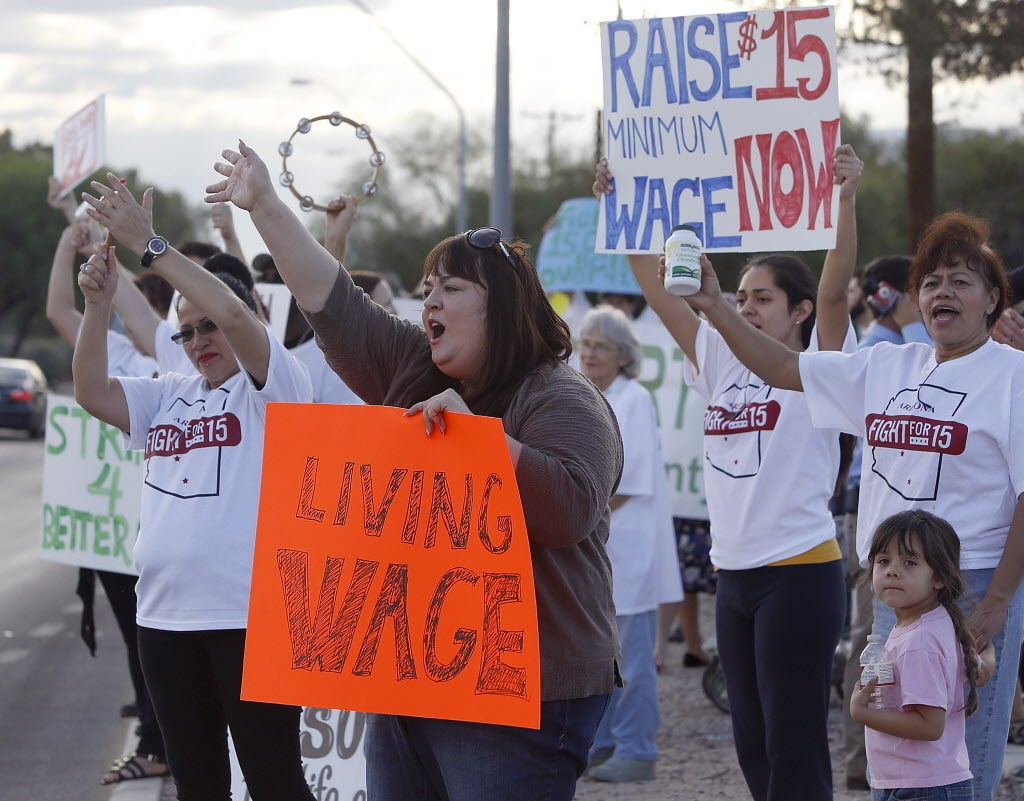Arizona’s minimum wage would rise to $12 an hour by 2020 if a campaign to increase the state’s base earnings for hundreds of thousands of workers succeeds.
The Arizonans for Fair Wages and Healthy Families campaign must collect 150,642 signatures from registered voters by July 7 to qualify the proposal for the November ballot.
The group registered Tuesday with the Arizona Secretary of State’s Office, giving supporters three months to get the measure on the ballot.
The initiative proposes to increase the state’s minimum wage to $10 an hour by 2017 from the current $8.05. Wages would gradually increase to $12 by 2020 and rise with the cost of living in future years.
The initiative also proposes that employees of large companies receive 40 hours a year in paid sick leave. That time could be used for illnesses and domestic-violence and public-health emergencies.
“Arizona workers have been falling farther and father behind in terms of their economic stability, and we need higher wages so that people can afford a place to live, pay for groceries and stimulate the economy to create more jobs,” said Bill Scheel, a consultant speaking on behalf of the campaign.
Based on labor statistics, he said, more than 1 million workers — most in the service industry — would be affected by the changes. He estimated 779,000 workers would be affected by the wage increase, while 934,000 would qualify for earned sick leave.
The initiative could compete with a separate effort by Republican lawmakers. Earlier this month, with the backing of the Arizona Restaurant Association, those lawmakers advanced their own measures to increase the minimum wage, maxing it out to $9.50 by 2020 with future increases based on the cost of living.
The Arizona campaign also comes as several major cities, including New York and Seattle, have recently passed minimum-wage increases to $15 hourly.
California Gov. Jerry Brown and legislators have a deal to increase that state’s wage to $15 an hour.
Arizona voters established the state’s minimum wage in 2006 at $6.75 an hour, and that ballot measure provided for cost-of-living increases.
Arizona’s current minimum wage translates into $16,744 a year for someone who works 40 hours a week. A worker earning $10 an hour would earn $20,800 annually. And a worker earning $12 an hour would earn $24,960.
Steve Chucri, president and CEO of the Arizona Restaurant Association, said representatives from the industry met several times with union members to see if they could find common ground on the competing minimum wage efforts. Their conversations were cordial, he said, but they were unable to agree on how to move forward with one initiative.
House Concurrent Resolution 2014, the minimum wage proposal backed by the Arizona Restaurant Association, would ask voters in November to raise the minimum wage to $8.41 during 2017, $8.77 during 2018, $9.13 during 2019 and $9.50 during 2020. The bill is making its way through the legislative process.
“At the end of the day, we weren’t able to reach a consensus that would meet the needs of our constituents, and meet the needs of their constituents,” said Chucri. “We’re going to go to the ballot with our proposal, which we think is the best proposal, and they’re going to go with theirs, and ... the best proposal will win.”
Given wage stagnation for some workers since 2006, Scheel said, a boost is needed. He said an increase “is very much consistent to where we are economically and helps pull up those at the very bottom, who need the help the very most.”
The campaign comes weeks after Gov. Doug Ducey, a Republican, signed into law a bill that allows state leaders to punish cities or counties that pass regulations that conflict with state law by withholding their state-shared revenue.
The bill reflected Ducey’s call during his January State of the State address to withhold tax revenue from cities and towns that enacted their own wage and employment laws.





